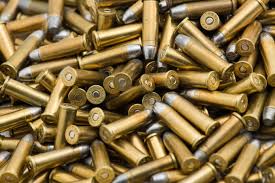Nigeria has spent about N804.10 billion on arms and ammunition imports between 2020 and the second quarter of 2025, according to new data released by the National Bureau of Statistics (NBS).
The report shows that despite government efforts to grow local production, the import bill for arms remains high, raising concerns over foreign exchange depletion and continued reliance on foreign suppliers for national defence.
Figures from the NBS revealed that in 2020, arms and ammunition imports stood at N29.24 billion. By 2021, it rose sharply to N72.50 billion, before dropping to N28.24 billion in 2022. Imports climbed again to N127.16 billion in 2023 and surged to a record N520.02 billion in 2024, the highest in five years.
Between January and June 2025, Nigeria imported N26.95 billion worth of arms. This was split into N22.08 billion in the first quarter and N4.87 billion in the second quarter. The figure is more than double what was spent in the same period of 2024, when N11.76 billion was recorded. However, in the second half of 2024, imports jumped to N508.25 billion, largely driven by a massive purchase of arms in the fourth quarter worth N483.85 billion.
Stakeholders Raise Concerns
Experts and industry players say the figures prove that Nigeria’s local defence production capacity has not yet taken off, even though the government signed reforms into law almost two years ago.
President Bola Tinubu in November 2023 signed the Defence Industries Corporation of Nigeria (DICON) Act. The new law repealed old provisions and sought to revive the sector by promoting research, innovation, and private sector collaboration. But stakeholders say progress has been slow, with import bills still showing heavy foreign dependence.
The Manufacturers Association of Nigeria (MAN), the National Association of Small-Scale Industrialists (NASSI), and the Centre for the Promotion of Private Enterprise (CPPE) told The Punch that continuous reliance on imports was draining foreign exchange and weakening national security. They argued that foreign suppliers could impose political conditions, which could undermine Nigeria’s sovereignty.
MAN Pushes for Local Partnerships
Director-General of MAN, Segun Ajayi-Kadir, said the body was already engaging with DICON to expand local arms production. He noted that some MAN members were already into military hardware manufacturing.
“We are in talks with DICON, and collaboration is only a matter of time. This is both a strategic and economic game changer,” Ajayi-Kadir said.
He added that a strong local defence industry would shield Nigeria from external embargoes, boost territorial defence, save scarce foreign exchange, and create new economic opportunities. According to him, foreign exchange saved from reduced imports could be redirected into raw materials and spare parts for industrial growth.
Ajayi-Kadir also argued that self-reliance in arms production could eventually make Nigeria an exporter. “We could develop indigenous military hardware and technology that may even be exported. That will help deepen economic stability,” he added.
NASSI, CPPE Stress Research and Innovation
National Vice President of NASSI, Segun Kuti-George, linked Nigeria’s import dependence to weak research and low industrial participation. He said small-scale players could contribute if given access to science-driven innovation.
“Encouraging local manufacturing is very important. God help you if your supplier is a friend of your attacker,” he warned.
Kuti-George said Nigeria must learn from countries that deliberately invest in research. He cited Lithuania’s drone innovation as an example, and urged Nigerian universities to prioritise practical research instead of theoretical dissertations.
Director of CPPE, Dr. Muda Yusuf, said local production was the only sustainable path. “When it comes to security matters, the less import-dependent a country is, the better. Strong countries do not rely on imports for their security,” he said.
He recalled how Nigeria once faced conditions from a foreign country before arms could be supplied during the peak of the Boko Haram crisis. “That showed why local capacity is crucial,” Yusuf added.
DICON Reforms and New Partnerships
Established in 1964, DICON was repositioned under the 2023 Act. The law empowered the state-owned corporation to set up subsidiaries, research centres, and financing structures to attract private investment.
Since then, DICON has signed partnership agreements with companies such as X-Shield Solution Company Limited, Buckler Systems Limited, and Epsilon Bronberg Innovation Limited to strengthen public-private collaboration.
In July 2025, DICON entered a $2 billion deal with SP Offshore Nigeria Limited to boost local arms manufacturing. Its Director-General, Major General Babatunde Alaya, said the partnership was part of the government’s plan to achieve self-sufficiency in defence production by 2027.
“This partnership will help reduce foreign importation and ensure Nigeria becomes self-sufficient in defence manufacturing,” Alaya said.
While stakeholders welcome these reforms, the rising import figures show that Nigeria’s journey toward building a sustainable military-industrial base remains a long one.
